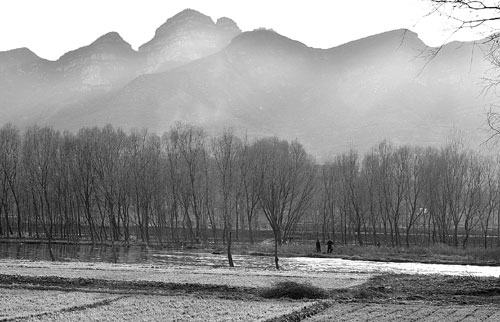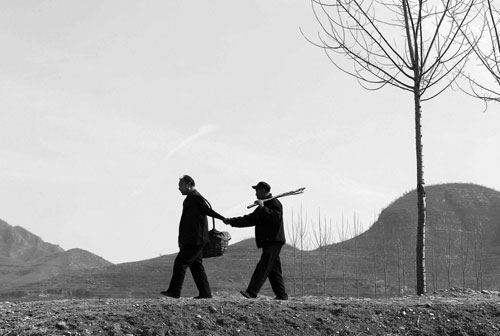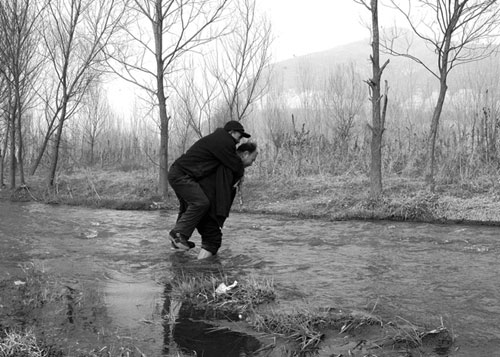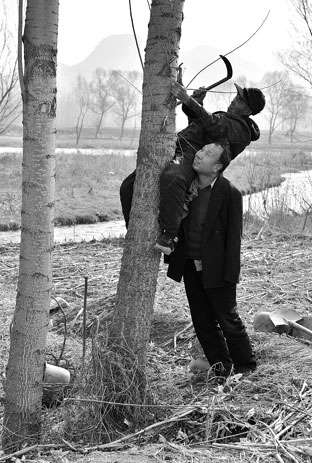Planters' punch
Updated: 2015-10-05 16:36
By Pei Pei and Sun Ye(China Daily USA)
|
||||||||
What once started as a low-income engagement for two disabled men is today turning into an ecological campaign. Pei Pei and Sun Ye report in Hebei province.
In April, when a sandstorm-the strongest in more than a decade in China-raged through the country's northern parts, at least two men said they felt little of it.
Jia Wenqi and Jia Haixia (not related), both suffering from disabilities and in their 50s, were spared most of the blasts of sand and other particles forced on cities and villages by strong winds, reminiscent of a scene from Christopher Nolan's 2014 movie Interstellar, as they were sheltered by trees.
The two men have helped raise a forest by planting thousands of trees on a stretch of 3.33 hectares, along the Ye River in Hebei province's Yeli village, over the past few years.
Jia Wenqi, who lost both his arms in an electrical accident at age 3, came up with the idea of planting trees for a living after quitting his job as a performer with the Hebei Disabled Persons' Art Troupe in 2000.
That year, his childhood friend, Jia Haixia, a miner from the village became blind in a workplace explosion. The friends then got together to plant trees.
Today, they are Hebei's heroes who have changed their once untended countryside into a green zone.
"We were fine in the woods, and didn't feel the change in weather," said Jia Wenqi of the time he spent amid aspens and willows on the evening of the April sandstorm. "But we got hit in the face with sand and small rocks once we came out."
Although it has taken almost 10 years for the saplings they planted to become trees, generations of people from Hebei, which is among the country's most polluted provinces, stand to benefit.
And now, when Jia Wenqi and Jia Haixia call out to society to do more for the area's greenery, companies, public institutions and individuals respond effectively.
Away from gray
But that wasn't the case in the early 2000s.
Back then, the picture was bleak for the two men, and not just in terms of their desire to earn money. Jia Wenqi, a bachelor, was without regular employment and had to care for his ailing father.
Similarly, Jia Haixia, was struggling financially after getting sacked from a mineral mine where his blindness had become an impediment at work. In addition, his wife was ill and their son was very young.
"Haixia was devastated. ... How couldn't he be? He became a disabled person so suddenly," said Jia Wenqi.
Jia Haixia called the period a "dark phase" and said, the question in his head was: "What could I do?"
The men then came to an understanding that they would earn from planting aspens and willows, two species that grow fast.
At the time, many calcium and magnesium mines in the area needed wooden crutches, which were used to support mining appliances, and that triggered their interest in trees.
Village authorities also allowed them to use an uncultivated plot of land to grow the trees.
"We didn't expect anything from them. It was just to give them something to do," said Zhao Ercang, a village official.
Jia Wenqi and Jia Haixia each lived on allowances for low-income families of less than 200 yuan ($31.3) a month. The average yearly income for the village is 3,000 yuan today.
The two men then started treading a daily path they would follow for years. Each morning, Jia Wenqi would visit Jia Haixia, let him clutch onto a sleeve of his shirt and walk. On reaching the plot of land "assigned" to them, the two men would till the soil and plant the saplings. To fetch branches to support the seedlings, Jia Haixia would climb on his friend's shoulders and inch upward.
To plant a tree, Jia Wenqi would steady an iron rod with his feet while the other would push the sapling into the soil.
In the first year, only two from among hundreds of saplings survived. But undeterred, they soldiered on.
"We were doing so because we wanted to earn a living," Jia Haixia said.
In 2007, the area's mining industry began to fail, dying in the subsequent years. Simultaneously, the duo had raised a small forest.
"The idea of protecting the environment then hit us," Jia Wenqi said, adding that he began to remember how Ye River was "so full of fish" and how green everything seemed earlier, not gray as it had become then.
Yeli village gets enough water from the river for irrigation and grows ample corn and wheat these days.
The forest is also now being turned into an ecological campaign.
Looking ahead
Encouraged by the green warriors of Hebei, people from other parts of the country have started to take steps to protect the environment.
"I'm very touched by your story," Baima Yuzhen, a medical worker from Nagqu prefecture in the Tibet Autonomous Region, told them after watching their story on TV.
She wanted to contribute to the cause, she said.
While Baima Yuzhen and charities have pitched in with money more recently, the Disabled Persons Federation, a government agency, earlier offered seed money to the two men to grow the trees.
"Perhaps it has something to do with the trees," said Zhao, the village official. "There used to be floods in the area but now the situation has changed. Maybe, the roots are keeping the water steady."
With its well-preserved historical sites and cultural remains from ancient battlefields, Yeli village is hoping to restart its economy on the back of tourism and its more recent green patches.
Shijiazhuang, the provincial capital and an industrial hub, has also vowed to re-create itself as a "forest city."
"We go to meetings and tell villagers how to make the place more green," Zhao added.
Meanwhile, the forest raised by the two friends is almost full now, requiring easier tasks like weeding and fending off stray cows. The property is estimated to be worth around 300,000 yuan.
But Jia Wenqi and Jia Haixia are unlikely to sell it, they said. In fact, they are starting another planting project on the hills outside the village.
They hope to fill the hills with trees in the near future.
That's their big dream at the moment.
"If everyone grows a tree in Hebei, imagine what our landscape will look like," Jia Wenqi said.
Contact the writers through sunye@chinadaily.com.cn

|
A green area of Yeli village in North China's Hebei province was created by locals Jia Wenqi and Jia Haixia. Zhang Zhen/ for China Daily |
|
Visually-impaired Jia Haixia (right) clutches onto a shirtsleeve of armless Jia Wenqi as they walk to their plot of land. Yan Zhiguo / Xinhua |
|
Jia Wenqi carries Jia Haixia cross the stream that leads to their plot. Du Jianwen / for China Daily |
|
Jia Wenqi helps Jia Haixia climb a tree to break a branch that will support seedlings in the soil. Zhang Zhen / for China Daily |
(China Daily USA 10/05/2015 page6)
- Russian warplanes hit IS targets in Syria
- Senior US envoy to visit Japan, S Korea, China
- Russia, US agree to cooperate in solving Syria crisis: Russian FM
- Iranian President calls Iran deal victory over war
- LatAm experts praise Xi on yuan, globalization
- Evidence found of summertime water flows on Mars: study
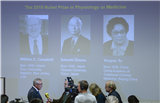
 China wins first Nobel in medicine
China wins first Nobel in medicine-
 Gary Locke: Candor key to relations
Gary Locke: Candor key to relations -
 Saving Chinese folk songs
Saving Chinese folk songs 
 Candlelight vigil for Oregon shooting victims
Candlelight vigil for Oregon shooting victims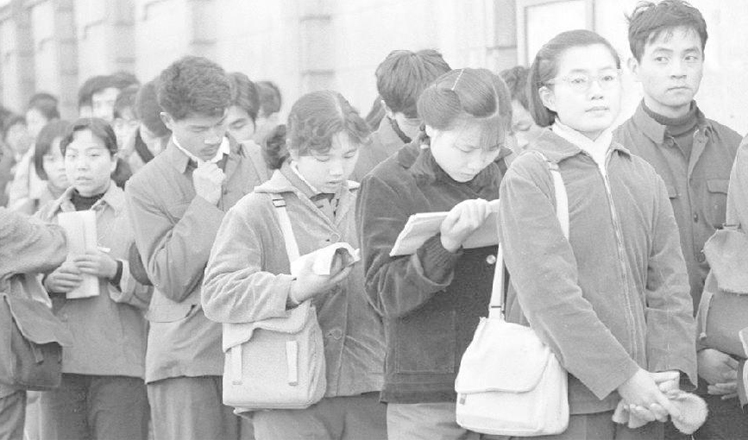
 Chinese people's pursuits in different eras
Chinese people's pursuits in different eras
 Ten highlights from Xi's trip to US and UN
Ten highlights from Xi's trip to US and UN
 Top 10 life-changing benefits from Xi's US visit
Top 10 life-changing benefits from Xi's US visit-
 Highlights of President Xi's speeches at UN
Highlights of President Xi's speeches at UN
Most Viewed
Editor's Picks

|

|

|

|

|

|
Today's Top News
Tu first Chinese to win Nobel Prize in Medicine
Huntsman says Sino-US relationship needs common goals
Xi pledges $2 billion to help developing countries
Young people from US look forward to Xi's state visit: Survey
US to accept more refugees than planned
Li calls on State-owned firms to tap more global markets
Apple's iOS App Store suffers first major attack
Japan enacts new security laws to overturn postwar pacifism
US Weekly

|

|
